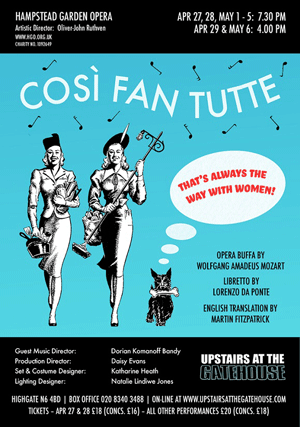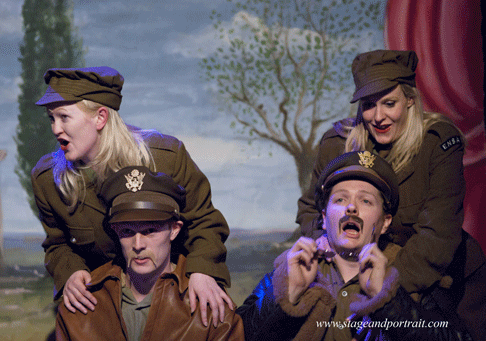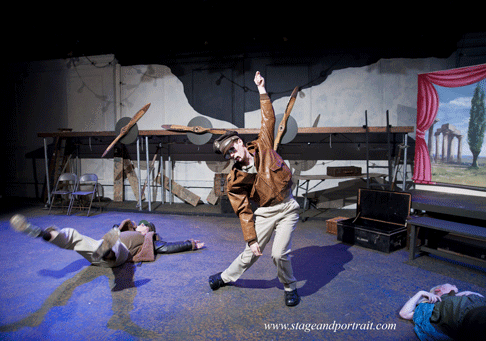
09 May 2012
My Big Fat American Moustache: A Wartime Così Fan Tutte
An energetic and exceptionally entertaining production of Così fan tutte sung in English and set during World War II, when the Americans often got the girls.
English Touring Opera are delighted to announce a season of lyric monodramas to tour nationally from October to December. The season features music for solo singer and piano by Argento, Britten, Tippett and Shostakovich with a bold and inventive approach to making opera during social distancing.
This tenth of ten Live from London concerts was in fact a recorded live performance from California. It was no less enjoyable for that, and it was also uplifting to learn that this wasn’t in fact the ‘last’ LfL event that we will be able to enjoy, courtesy of VOCES8 and their fellow vocal ensembles (more below …).
Ever since Wigmore Hall announced their superb series of autumn concerts, all streamed live and available free of charge, I’d been looking forward to this song recital by Ian Bostridge and Imogen Cooper.
Although Stile Antico’s programme article for their Live from London recital introduced their selection from the many treasures of the English Renaissance in the context of the theological debates and upheavals of the Tudor and Elizabethan years, their performance was more evocative of private chamber music than of public liturgy.
Evidently, face masks don’t stifle appreciative “Bravo!”s. And, reducing audience numbers doesn’t lower the volume of such acclamations. For, the audience at Wigmore Hall gave soprano Elizabeth Llewellyn and pianist Simon Lepper a greatly deserved warm reception and hearty response following this lunchtime recital of late-Romantic song.
For this week’s Live from London vocal recital we moved from the home of VOCES8, St Anne and St Agnes in the City of London, to Kings Place, where The Sixteen - who have been associate artists at the venue for some time - presented a programme of music and words bound together by the theme of ‘reflection’.
'Such is your divine Disposation that both you excellently understand, and royally entertaine the Exercise of Musicke.’
‘And there was war in heaven: Michael and his angels fought against the dragon; and the dragon fought and his angels, And prevailed not; neither was their place found any more in heaven … that old serpent … Satan, which deceiveth the whole world: he was cast out into the earth, and his angels were cast out with him.’
There was never any doubt that the fifth of the twelve Met Stars Live in Concert broadcasts was going to be a palpably intense and vivid event, as well as a musically stunning and theatrically enervating experience.
‘Love’ was the theme for this Live from London performance by Apollo5. Given the complexity and diversity of that human emotion, and Apollo5’s reputation for versatility and diverse repertoire, ranging from Renaissance choral music to jazz, from contemporary classical works to popular song, it was no surprise that their programme spanned 500 years and several musical styles.
The Academy of St Martin in the Fields have titled their autumn series of eight concerts - which are taking place at 5pm and 7.30pm on two Saturdays each month at their home venue in Trafalgar Square, and being filmed for streaming the following Thursday - ‘re:connect’.
The London Symphony Orchestra opened their Autumn 2020 season with a homage to Oliver Knussen, who died at the age of 66 in July 2018. The programme traced a national musical lineage through the twentieth century, from Britten to Knussen, on to Mark-Anthony Turnage, and entwining the LSO and Rattle too.
With the Live from London digital vocal festival entering the second half of the series, the festival’s host, VOCES8, returned to their home at St Annes and St Agnes in the City of London to present a sequence of ‘Choral Dances’ - vocal music inspired by dance, embracing diverse genres from the Renaissance madrigal to swing jazz.
Just a few unison string wriggles from the opening of Mozart’s overture to Le nozze di Figaro are enough to make any opera-lover perch on the edge of their seat, in excited anticipation of the drama in music to come, so there could be no other curtain-raiser for this Gala Concert at the Royal Opera House, the latest instalment from ‘their House’ to ‘our houses’.
"Before the ending of the day, creator of all things, we pray that, with your accustomed mercy, you may watch over us."
The doors at The Metropolitan Opera will not open to live audiences until 2021 at the earliest, and the likelihood of normal operatic life resuming in cities around the world looks but a distant dream at present. But, while we may not be invited from our homes into the opera house for some time yet, with its free daily screenings of past productions and its pay-per-view Met Stars Live in Concert series, the Met continues to bring opera into our homes.
Music-making at this year’s Grange Festival Opera may have fallen silent in June and July, but the country house and extensive grounds of The Grange provided an ideal setting for a weekend of twelve specially conceived ‘promenade’ performances encompassing music and dance.
There’s a “slide of harmony” and “all the bones leave your body at that moment and you collapse to the floor, it’s so extraordinary.”
“Music for a while, shall all your cares beguile.”
The hum of bees rising from myriad scented blooms; gentle strains of birdsong; the cheerful chatter of picnickers beside a still lake; decorous thwacks of leather on willow; song and music floating through the warm evening air.

An energetic and exceptionally entertaining production of Così fan tutte sung in English and set during World War II, when the Americans often got the girls.
Daisy Evans, who directed Così fan tutte for Hampstead Garden Opera, had the wonderfully inspired idea of setting it in Sicily, in October 1943, at the height of the Allies’ Italian campaign. Ferrando and Guglielmo become two young British lieutenants, briefly on leave from the front on the mainland, and Fiordiligi and Dorabella two giddy members of an Entertainments National Service Association (ENSA) concert troupe sent out to divert the Allied soldiers. By this historical juncture British and American troops were fighting together, and this provides Ferrando and Guglielmo with a good reason to disguise themselves as Americans. Evans describes the scenario in her “Director’s Note” as “a micro society built far from home with people you’d never normally encounter, where motivation, morals and hope become plastic, changeable and precarious.” It’s all very convincing.
I was reminded of Kenneth Branagh’s sadly underrated cinematic updating of Love’s Labour’s Lost, set in the late 1930s with the threat of war looming over Europe — not least because of the striking parallels between Shakespeare’s very unconventional comedy and Mozart’s opera. In both cases the introduction of the realities of war gives an “edge” to proceedings often represented as unfolding in a dreamy never-never space, while also, paradoxically, somehow justifying any silliness that does not involve mass slaughter.
Evans’s concept works brilliantly in every respect, and I have no hesitation declaring this the most dramatically solid Così I’ve seen. In the original Da Ponte opera, the decision of Ferrando and Guglielmo to disguise themselves as bushily-moustached Albanians who happen to speak perfect Italian is basically farcical, very much like the lovers pretending to be Russians in Love’s Labour’s Lost. One feels they could be from any country, for all that it matters; one cannot imagine the mere fact of their being Albanian adding to their attraction. By contrast, in the Hampstead Garden Opera production the decision of the lovers to impersonate Americans has real point, and the lines about moustaches are actually funnier — at least if you’re British. In seeming to be Americans, Ferrando and Guglielmo are seen to have an immediate advantage over their British counterparts: they are wealthier, better dressed, more confident, gung-ho and “with it.” They have wonderful things like chocolate and nylon stockings, and can advertise their sexual prowess through raunchier modes of dancing. From the moment they first appear it is obvious the “real” Ferrando and Guglielmo are involved in an unequal struggle. Theatrically speaking, too, the old cliché about two countries divided by a common language allows for plenty of fun, in general the attempts at American pronunciation being (I take it) deliberately bad and inconsistent.
 (Left to right) Sarah Denbee (Dorabella), Henry Manning (Guglielmo), Zachary Devin (Ferrando), and Maud Millar (Fiordiligi)
(Left to right) Sarah Denbee (Dorabella), Henry Manning (Guglielmo), Zachary Devin (Ferrando), and Maud Millar (Fiordiligi)
The production utilizes an English translation by Martin Fitzpatrick, tweaked here and there to reference the 1940s situation. It is beautifully idiomatic and faithful to the music’s rhythms; this, in combination with the clear articulation of the singers, made it remarkably easy to hear almost every word. And it was worth paying attention, for line after line had the audience indulging not just in polite chortles but unrestrained hilarity. Two examples from Despina: “What do you think your lovers will do on ‘active service’?”; “Eat up the pasta, but leave room for the salami!” Examples of sensitive modernizing include Ferrando and Guglielmo telling Don Alfonso “You’re a bitter old cynic. / You should be in a clinic” and “I think we’ll hit the jackpot.” One line which caught everyone’s attention was Guglielmo’s describing Fiordiligi as a “faithless, double-crossing, deceitful, lying bitch!” While Italian “cagna” does translate as “bitch,” in the original it is merely the last in a string of nouns, some of them rather past their sell-by date. The piling up of adjectives in the English made the b-word far more emphatic; the fact that it seemed more likely to be spoken by Guglielmo’s assumed American character made the rhetorical moment a memorable coup de théâtre.
The thoroughly entertaining and easily accessible dialogue, the irresistible buffoonery surrounding the “American” imposture, the well-judged, hammy performances by the sisters, who gave the general impression of feeling lucky that they had men at all, let alone two each, and the bounce and verve which Hampstead Garden Opera brought to the whole performance, made it difficult to remember that Mozartean opera is often disparaged as an elitist pastime even by people who like Shakespeare, or who will queue in the rain for a Leonardo da Vinci exhibition. There was nothing elitist about this production. It was popular Mozart, but not dumbed down Mozart, and in fact more intellectually engaging than many a “classic” production in the original language. (When he directed a landmark Magic Flute in English in 1911, Edward Dent argued that there were no limits to the potential popularity of Mozartean opera in Britain, provided it were performed in good translations — I’m now convinced he was right.) A glance around the utterly unpretentious Upstairs at the Gatehouse theatre revealed a very diverse audience of the young and old, fashionable and unfashionable, and (I would guess) very different income levels. A deep and unforced sense of pleasure appeared to be general.
In productions like this, put together on shoestring budgets, goodwill and enthusiasm, it is of course unreasonable to expect the very highest musical standards. But that acknowledged, the level was remarkably high, and one would have needed a fastidious ear or uncompromising “professional” standard to go home feeling unsatisfied. The six principals were all outstanding, and if their singing tended to the robust rather than the subtle, this fitted the generally spirited nature of the production. They all possessed a strong stage presence, displayed fine acting skills, and brought an infectious zest to everything they did.
 Zachary Devin (Ferrando), Henry Manning (Guglielmo, and Sarah Denbee (Dorabella)
Zachary Devin (Ferrando), Henry Manning (Guglielmo, and Sarah Denbee (Dorabella)
The musical director was Dorian Komanoff Bandy, who has undertaken extensive research into historical performance practices in Mozart’s operas and brings the results to this particular production. I can do no better than quote his own account: “In our production of Così, we see the musical text not as a finished document, but as a starting point. True to 18th-century practices, cadenzas will be fitted to the individual singers, and will vary with each performance. Ornamentation will likewise be mostly unpremeditated. Even my recitative continuo, which I will play on a fortepiano similar to Mozart’s, will be active and pervasive, participating in the dramatic action rather than accompanying it. (Would Mozart, the great showman, have sat idly at the keyboard and strummed chords only at cadences?)” I am not qualified to comment on the historical claims made here, but there was no arguing with the fact that the approach brought the music to life in a way which suited the production perfectly. Komanoff Bandy’s palpable passion for what he was doing matched that of the principals on stage, and he secured some very fine playing from his little orchestra. Tempos were fast, but not excessively so, and the music bristled with energy, conveying a general sense of urgency and agitation appropriate to the unstable wartime scenario. This was not the “Classical” or even the “Romantic” Mozart, but it was an unquestionably theatrical Mozart.
It is worth adding, in conclusion, that Hampstead Garden Opera, founded in 1990, has always had a special affinity for Mozart. In fact the company was established specifically with a view to performing his operas, and though they have gone on to explore the works of many other composers, they have kept returning to Mozart. But in the past they have focused mainly on Don Giovanni, Figaro, and The Magic Flute. This is only the second time they have presented Così fan tutte, making it all the more praiseworthy that they have pulled off such a bold and successful reinterpretation.
David Chandler
Cast